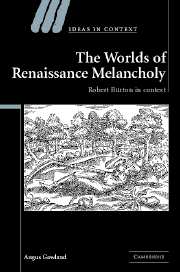Book contents
5 - Utopia, consolation, and withdrawal
Published online by Cambridge University Press: 13 January 2010
Summary
Although the vibrant eclecticism of the Anatomy is a sign of the continued productivity of humanist philosophy in Jacobean England, the work is also an eloquent testament to the deepening anxiety felt by many of its practitioners in the face of political reality. Humanists continued to cherish their traditional role as servants and moral reformers of the commonwealth, but the necessities engendered by an era of widespread religious conflict were beginning to place their values in question and erode their political influence. Many Jacobean humanists could be considered well prepared for this problem, as their Elizabethan predecessors had gone to great lengths to address themselves to the practical and court-centred nature of a great proportion of political endeavour. Yet their dependence on the court environment, and the patronage it provided, created serious intellectual and material difficulties. In this chapter, I shall be addressing Burton's portrayal of the predicament of the early Stuart scholar, as manifested in his interweaving of political and personal concerns throughout his work. As we shall see, this constituted a characteristically melancholic commentary on the status of the learned culture to which he had devoted his life.
From the later decades of the sixteenth century onwards, humanists' prospects of acting as counsellors to the powerful in Church and state had steadily worsened. The court of Henry VIII had provided prominent positions for such scholars as Thomas Lupset, Richard Pace, Sir Thomas Elyot, Sir Thomas More, and John Clerk.
- Type
- Chapter
- Information
- The Worlds of Renaissance MelancholyRobert Burton in Context, pp. 246 - 294Publisher: Cambridge University PressPrint publication year: 2006

